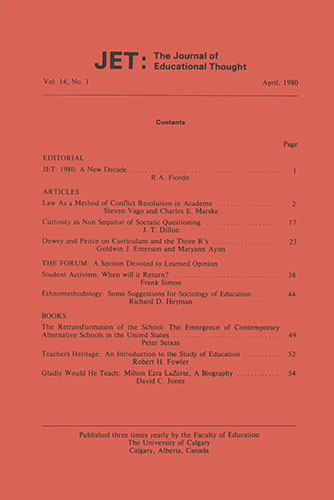Curiosity as Non Sequitur of Socratic Questioning
DOI:
https://doi.org/10.55016/ojs/jet.v14i1.43861Abstract
Although Socratic questioning is sometimes said to stimulate curiosity, analysis of the dialogues reveals that curiosity cannot be seen to follow from the questioning method. Other factors, including the felt importance of knowing, may account for curiosity but constitute preconditions rather than results of questioning. The dialogue texts show that the most successful episodes from the pedagogical point of view involve respondents who were already curious at the start. Hence a critical examination may be needed of the traditional grounds for a common educational notion, that teacher questioning-like Socrates' arouses curiosity and inquiry in the student.
Downloads
Published
Issue
Section
License
The Journal of Educational Thought retains first publication rights for all articles. The Journal grants reproduction rights for noncommercial educational purposes with the provision that full acknowledgement of the work’s source be noted on each copy. The Journal will redirect to the appropriate authors any inquiries for further commercial publication of individual articles. All authors wishing to publish in JET will be asked to fill in and sign a Consent to Publish and Transfer of Copyright agreement.
Authors must affirm that any submission to JET has not been and will not be published or submitted elsewhere while under considration by JET.

